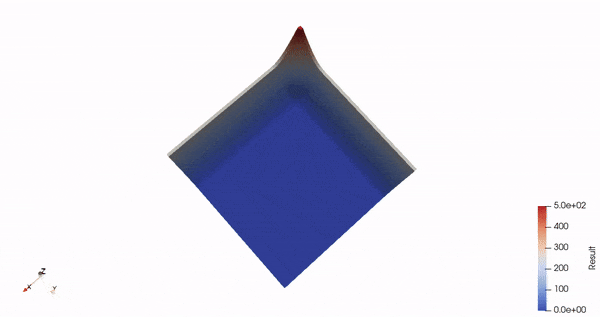3 unstable releases
| 0.2.0 | Oct 29, 2024 |
|---|---|
| 0.1.2 | Oct 4, 2024 |
| 0.1.1 | Oct 4, 2024 |
| 0.1.0 |
|
#87 in Simulation
229 downloads per month
22KB
422 lines
rs_isl
rs_isl is an implementation of Iterative Stencil Loops in Rust. ISLs can be used in a variety of scenarios such as image processing, fluid simulation and the calculation of PDEs. For more information see Wikipedia.
Example
This animation was created with Paraview from the data created by the example two_waves.

Output
rs_isl writes .vtk output files to a specified path. Their contents may be defined by the user.
To create those files rs_isl uses the vtkio crate.
Usage
General
use core::f64;
use std::{cmp::max, path::PathBuf};
use rs_isl::*;
fn main() {
// create a domain with a size of 200 by 100
let dim = (200, 100)
// we only access the left neighbour of every cell
let neighbours = vec![(-1, 0)];
// take neighbours value, if there is no neighbour decrease by 3
let op = |num: &f32, nb: Vec<Option<&f32>>| {
if nb.first().unwrap().is_some() {
let f = *nb[0].unwrap();
return f;
}
return max(*num as i32 - 3, 0) as f32;
};
// creates a sine shape at the left boundary of the domain
let init = |x: usize, _y: usize| {
if x < DIM.0 / 10 {
let fac = x as f64 / (DIM.0 / 10) as f64 * f64::consts::FRAC_PI_2;
return (250.0 - 250.0 * fac.sin()) as f32;
}
0.0
};
// create the simulation parameters
let params = IslParams::new(
dim,
op,
// number of threads for simulation, the domain size must be divisible by this number
10,
init,
// number of simulation steps
200,
// number of output steps
100,
neighbours,
// path for writing vtk files
PathBuf::from("raw"),
);
// run the simulation
run_isl(params).unwrap();
}
Setting output values for a custom data type
struct Point {
x: u32,
y: u32,
}
impl VtkOutput for Point {
fn value_names() -> Vec<String> {
// define the names of the DataArrays
vec!["x_coord".into(), "y_coord".into()]
}
fn cellvalue(&self) -> Vec<f32> {
// write the values for every cell
vec![self.x as f32, self.y as f32]
}
}
Dependencies
~4–8.5MB
~88K SLoC